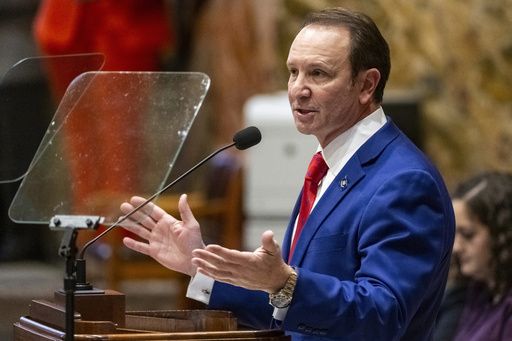
BATON ROUGE, La.
— Governor Jeff Landry of Louisiana is advocating for a major revision of the state’s complicated tax code, aiming to implement cuts to both income and corporate taxes. However, a Senate committee recently introduced substantial amendments to this ambitious reform package in response to apprehensions expressed by legislators, lobbyists, and local government officials.
The primary objective of the tax overhaul is to create a more streamlined and business-friendly tax environment. Landry and his supporters, who hold a majority in the legislature, argue that by lowering corporate income tax rates and eliminating the 0.275% corporate franchise tax—an annual fee that generates over $500 million from companies operating in Louisiana—the state may enhance its economic landscape. Additionally, transforming the individual income tax into a flat 3% rate is intended to keep Louisiana competitive with nearby states, particularly Texas, which levies no personal income tax.
Moreover, the overhaul proposes to impose taxes on digital goods and services, such as streaming platforms, which could yield approximately $40 million each year in revenue. These adjustments are also set to provide funding for increased teacher salaries and to double exemptions for senior citizens from income tax.
However, the proposed reforms have encountered resistance from various stakeholders, including local government leaders, legislative representatives from both political parties, and special interest groups spanning from the film industry to petrochemical advocates. The legislature’s special session is scheduled to conclude in three weeks, adding urgency to discussions. “There’s a consensus that this is being rushed and could lead to significant negative consequences,” remarked Democratic Representative Mandie Landry, a vocal critic of the proposed tax changes.
Local governments have raised alarms over a potential loss of crucial revenue, although Landry has assured them that measures will be taken to mitigate these losses. For instance, Rapides Parish is projected to lose over $20 million due to the proposed changes, as stated by Tax Administrator Betty Jo Bourgeois.
In a bid to address concerns, the Senate Revenue and Fiscal Affairs committee has amended the proposal to permit local authorities to continue imposing taxes on prescription medications, a vital revenue stream initially threatened by the reforms. Nonetheless, Bourgeois expressed uncertainty regarding her parish’s financial stability following the proposed changes.
Originally, the tax reform package suggested eliminating tax credits linked to film production and the development of historic properties; however, these credits were preserved, albeit with some reductions, after intense pushback from industry stakeholders. The committee also opted to maintain tax incentives for foreign trade zones at Louisiana ports tailored for the oil and gas sector, ensuring substantial savings for those industries.
While several Democratic lawmakers have supported the tax reform proposals, a faction opposes the measures on the premise that they disproportionately favor corporate shareholders at the expense of lower-income households. A recent report from a progressive think tank highlights that Louisiana’s tax system ranks as the tenth most regressive nationwide.
Crucially for the tax overhaul’s success, a faction of Republican lawmakers has expressed skepticism about the inclusion of new sales taxes on services, causing a stalemate regarding the revenue-generating elements of the plan.
To address the anticipated $1.3 billion budget shortfall resulting from the proposed income tax reductions, lawmakers are pressed to find a workable solution. A vital bill that expands sales tax to 42 new services, such as car washes, requires the backing of approximately six or seven Republican legislators to secure the two-thirds majority necessary for passage. However, this bill has been stalled in the House, noted by Representative Neil Riser, who sponsors the legislation.
To appease dissenters, Riser has suggested narrowing the scope of taxable services to just 19. Meanwhile, Senator Franklin Foil, the chair of the Revenue and Fiscal Affairs committee, acknowledged a lack of enthusiasm for extending sales taxes to additional services at this point.
On Tuesday, the committee also proposed reducing the highest corporate income tax rate from 7.5% to 6%, although Governor Landry initially sought a flat rate of 3.5%. Another avenue for potential revenue generation includes an increase in the statewide sales tax to 4.50%, while Landry’s proposal aimed to maintain the current rate of 4.45% by extending a temporary increase of 0.45% that is due to expire next year.
Louisiana currently holds the distinction of having the highest combined state and average local sales tax rate in the United States, which stands at 9.56%. Foil expressed optimism that achieving a lower income and corporate income tax rate would positively impact the state, despite the necessity of higher sales taxes to facilitate it. “It’s a decision we will need to confront,” Foil stated.

